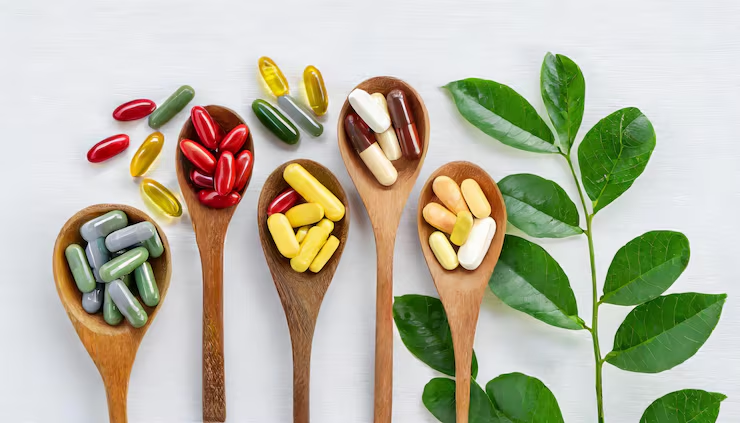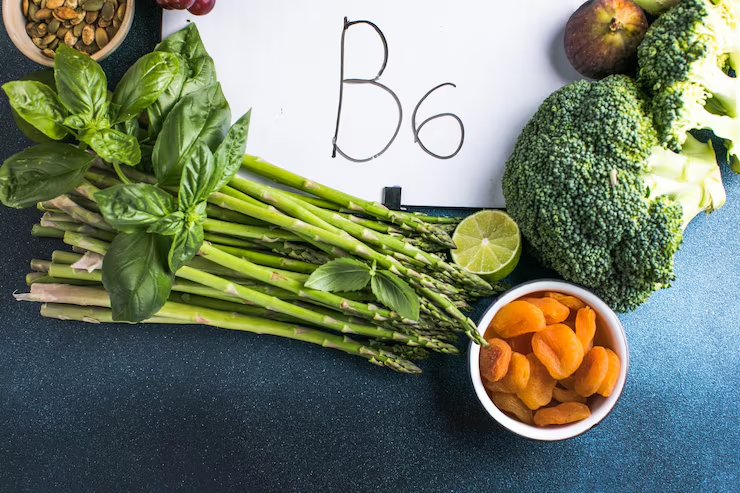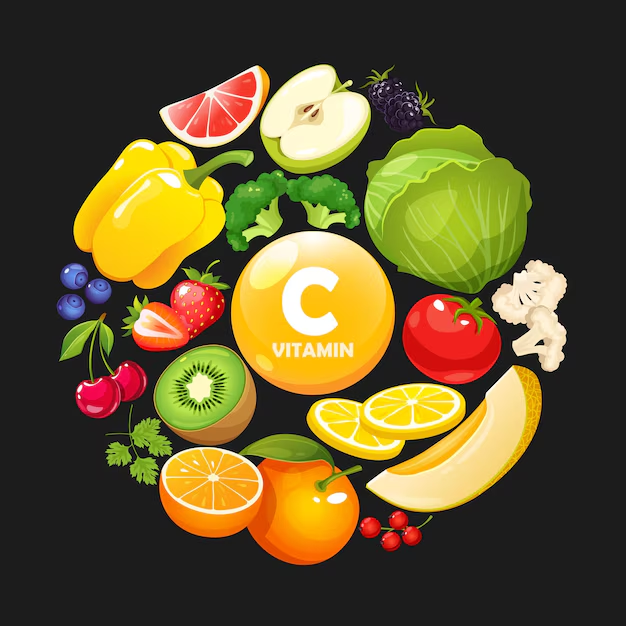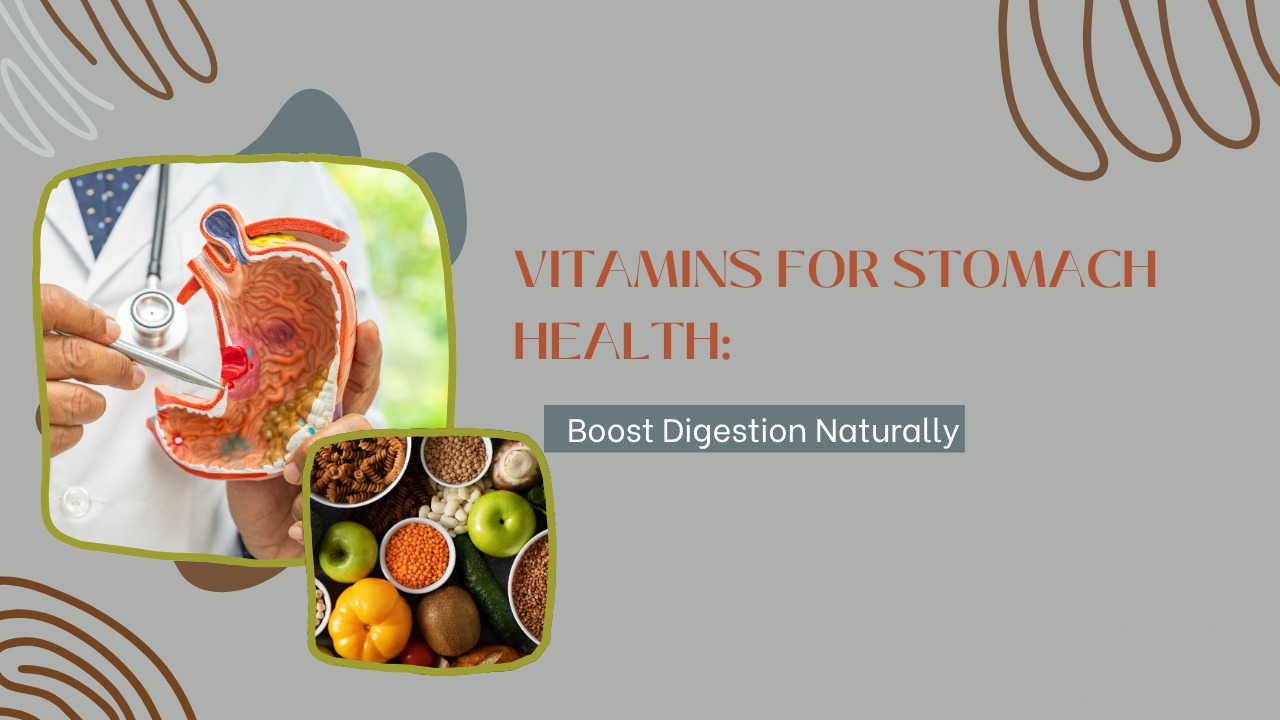Vitamins for stomach health are essential for maintaining a balanced digestive system and preventing common issues like bloating, indigestion, and acid reflux. In today’s fast-paced world, many people experience discomfort due to poor diet, stress, or irregular eating habits. Supporting the stomach with the right nutrients can significantly improve digestive efficiency and overall well-being.
Key vitamins for stomach health include vitamin B-complex, which aids in breaking down food, and vitamin D, which helps regulate inflammation in the gut. Vitamin C supports tissue repair in the stomach lining, while vitamin A promotes the health of mucous membranes. These vitamins, whether consumed through food or supplements, can enhance gut function and help prevent long-term issues.
Taking a proactive approach with vitamins for stomach health can restore digestive balance. In this article, we’ll explore which vitamins are best, how to use them safely, and offer eight practical tips to nourish your gut naturally and effectively.

What Are Vitamins for Stomach Health ?
Vitamins for stomach health are essential nutrients that help maintain the integrity and function of your digestive system. These vitamins support everything from the stomach lining to the gut microbiome, making them vital for daily digestive comfort and long-term gut resilience.
Key vitamins for stomach health include B-complex vitamins, which aid in nutrient breakdown and energy production, and vitamin C, which helps reduce inflammation and supports tissue repair. Vitamin A contributes to maintaining a healthy mucosal lining, while vitamin D supports immune balance in the gut. Vitamin K is involved in gut lining regeneration, and certain vitamin-like compounds also help enhance digestive enzyme activity.
By regularly including these nutrients through whole foods or supplements, you can promote a healthier, more efficient digestive system. When taken consistently and mindfully, vitamins for stomach health can improve digestion, support good gut bacteria, and protect against common digestive issues like bloating or indigestion.
Why Vitamins for Stomach Health Matter
Support gut‑lining integrity: Vitamins such as A and D help maintain the stomach and intestinal mucosa.
Enhance digestion: B‑vitamins (like B1, B2, B3, B6, B12) assist enzyme systems and nutrient absorption.
Strengthen immune defence: Vitamin C and D modulate inflammation and immunity in the GI tract.
Balance microbiota: Vitamins influence friendly bacteria and suppress harmful overgrowth.
Aid recovery from irritation: Nutrient‑rich support helps heal gastritis, ulcers, or damage from NSAIDs or yeast.
When You Need Vitamins for Stomach Health
If you experience any of the following:
Occasional indigestion or heartburn
Bloating or gas after meals
Irregular bowel habits (constipation or mild diarrhea)
Recovery after antibiotic use
Stress‑related stomach upset
these are times when vitamins for stomach health can offer extra support. Also, if diet lacks fresh vegetables, fermented foods, or nutrient variety, supplementation—or smart food choices—can help fill gaps.
How to Use Vitamins for Stomach Health
Vitamins for stomach health can be used effectively by combining dietary choices with smart supplementation. Start by incorporating vitamin-rich foods such as leafy greens, citrus fruits, sweet potatoes, eggs, and fermented items like yogurt or kefir into your daily meals. These offer a natural source of B-vitamins, vitamins A, C, D, and K—all crucial for gut integrity and function.
If your diet lacks variety or you’re dealing with digestive issues, consider supplements. A low-dose multivitamin tailored for digestion, or individual supplements like vitamin D with K2, vitamin C with zinc, or B-complex can be helpful. Always choose high-quality, bioavailable forms for better absorption and minimal irritation.
Finally, consistency is key. Take vitamins for stomach health with meals to improve absorption and reduce chances of nausea. Track how your body responds, and consult a healthcare provider for personalized guidance—especially if you have chronic conditions or are on medications affecting digestion.
Food first: prioritize whole foods rich in these vitamins.
Supplements smartly: if needed, choose moderate doses—not megadoses—especially for fat‑soluble vitamins (A, D, K).
Spread intake: take B‑vitamins with meals; vitamin C can be divided dose if high; vitamin D ideally with fat.
Monitor tolerance: vitamin C in high doses may cause mild acid or loose stool; watch for that.
Balanced synergy: some vitamins work better together (e.g. D + K), so pick balanced supplements if supplementing.
Check interactions: discuss with your healthcare provider if you take medications or have conditions like kidney disease.
Top Tips: Vitamins for Stomach Health
Here are the eight best vitamin‑based tips to boost digestive wellness. Each tip includes the nutrient focus, typical food or supplement sources, and key benefits.
Add Vitamin B Complex Foods

Vitamins for stomach health play a vital role in supporting digestion, and the B vitamin complex is especially important. This group includes B1 (thiamine), B2 (riboflavin), B3 (niacin), B6, B9 (folate), and B12, all of which contribute to energy production, nerve function, and the breakdown of carbohydrates, proteins, and fats—key processes for smooth digestion.
You can find B vitamins in a wide range of foods. Whole grains like brown rice and oats, leafy greens such as spinach, and legumes like lentils and chickpeas are excellent sources. Eggs, dairy, meat, and fish provide B12, which is crucial for gut lining health and often lacking in vegetarian diets. Fortified cereals are also helpful for maintaining adequate B vitamin intake.
Incorporating these vitamin B complex foods into your meals ensures your body gets essential vitamins for stomach health, helping to reduce bloating, improve nutrient absorption, and support a healthier digestive system overall.
Ingredients: Whole grains (oats, brown rice), legumes (lentils, chickpeas), nuts and seeds, eggs, dairy, leafy greens.
Vitamin focus: B1 (thiamine), B2 (riboflavin), B3 (niacin), B6, B12, folate.
Benefits:
Supports enzyme function for carbohydrate, protein, and fat digestion.
Promotes healthy gastric acid levels and smooth digestion.
Helps maintain energy for gut motility.
Including vitamin B complex through food or low‑dose supplements gives a gentle daily boost to promote vitamins for stomach health.
Include Vitamin C‑Rich Produce

Vitamins for stomach health include Vitamin C, a powerful antioxidant that supports digestion and boosts immune function. Vitamin C helps protect the stomach lining, aids in iron absorption, and supports the body’s ability to manage inflammation—especially important for those with ulcers, gastritis, or indigestion.
You can easily increase your intake of Vitamin C by including more fresh fruits and vegetables in your diet. Citrus fruits like oranges, lemons, and grapefruits are classic sources, but other excellent options include strawberries, kiwi, bell peppers, broccoli, and Brussels sprouts. These foods are not only rich in Vitamin C but also offer fiber, which supports gut regularity.
Adding Vitamin C–rich produce to your meals can enhance the effectiveness of vitamins for stomach health, helping your body absorb nutrients more efficiently and protecting your digestive system from oxidative stress. Enjoying a colorful variety of fruits and vegetables daily is a simple step toward better gut wellness.
Ingredients: Citrus (orange, lemon), kiwi, strawberries, bell peppers, broccoli, papaya.
Vitamin focus: Vitamin C (ascorbic acid).
Benefits:
Helps heal and protect stomach lining.
Acts as an antioxidant to reduce inflammation in gut tissue.
Supports collagen formation for mucosal integrity.
Having vitamin C daily through produce enhances vitamins for stomach health especially during times of stress or minor irritation.
Get Vitamin A from Carotenoids
Vitamins for stomach health wouldn’t be complete without Vitamin A, especially in the form of carotenoids—plant-based compounds that your body converts into active Vitamin A. This essential nutrient helps maintain the integrity of the stomach lining, supports mucous production, and plays a role in immune defense against harmful gut bacteria.
Carotenoids are found in deeply colored vegetables and fruits such as carrots, sweet potatoes, pumpkin, spinach, and kale. These vibrant foods are not only visually appealing but also rich in beta-carotene, lutein, and zeaxanthin—key carotenoids that support both digestive and overall health. When paired with healthy fats like olive oil or avocado, their absorption improves significantly.
Including carotenoid-rich foods in your diet ensures you get a natural source of vitamins for stomach health. Regular intake helps soothe inflammation, protect the gastrointestinal tract, and maintain proper nutrient absorption—all essential for a healthy and balanced digestive system.
Ingredients: Sweet potato, carrot, pumpkin, spinach, kale, liver (if you eat animal products).
Vitamin focus: Vitamin A (from beta‑carotene and retinol).
Benefits:
Maintains protective mucous secretion in stomach and intestines.
Regulates cell turnover in the gut lining.
Helps prevent leaky gut and supports immune cells in gut mucosa.
These vitamin A‑rich foods are excellent contributors to your intake of vitamins for stomach health.
Support with Vitamin D + K Combo
Vitamins for stomach health should include the powerful combination of Vitamin D and Vitamin K, especially for individuals dealing with chronic digestive issues or nutrient malabsorption. Vitamin D supports immune function, reduces gut inflammation, and enhances calcium absorption, which plays a role in muscle function throughout the digestive tract.
Vitamin K, particularly K2, complements Vitamin D by directing calcium to the bones and away from arteries and soft tissues. It also contributes to proper blood clotting and may help prevent gastrointestinal bleeding in at-risk individuals. This synergy is especially beneficial when both vitamins are taken together through diet or supplements.
Foods such as fatty fish, egg yolks, fermented cheeses, and leafy greens can help you maintain balanced levels. By combining these nutrients, you’re giving your gut the structural and immune support it needs. Including the D+K duo is a smart strategy for enhancing vitamins for stomach health and promoting long-term digestive wellness.
Ingredients: Fatty fish (salmon, mackerel), fortified dairy or plant milks, eggs, mushrooms (for D); leafy greens, fermented vegetables or natto (for K2).
Vitamin focus: Vitamin D3, Vitamin K2.
Benefits:
Vitamin D modulates gut immunity and reduces inflammation in digestive tract.
Vitamin K2 supports microbiome and calcium handling relevant to gut environment.
Combined they support gut barrier and general metabolic balance.
Taking D with K (either through food synergy or supplement combo) is a powerful pair in vitamins for stomach health support.
Zinc‑Carotene & Vitamin C Combo

Combining essential nutrients like zinc, beta-carotene, and vitamin C can offer powerful support for digestive wellness. These nutrients work synergistically to reduce inflammation, protect the stomach lining, and boost immune function within the gut. Zinc plays a critical role in healing the gut barrier, while vitamin C helps neutralize harmful free radicals that may contribute to stomach discomfort.
Beta-carotene, a precursor of vitamin A, enhances the production of mucus in the gastrointestinal tract, providing a protective layer against irritation and acid. When paired with zinc and vitamin C, it creates a balanced formula to defend and strengthen your digestive system from multiple angles. This trio is especially useful in preventing or reducing symptoms of ulcers, gastritis, and indigestion.
Including this combo in your diet is a practical way to maximize the benefits of vitamins for stomach health. Opt for foods like carrots, spinach, citrus fruits, and pumpkin seeds, or consider quality supplements after consulting your healthcare provider.
Ingredients: Oysters, red meat (for zinc), sweet potato/carrot (beta‑carotene), citrus or berries (vitamin C).
Vitamin focus: Zinc + Vitamin A/β‑carotene + Vitamin C.
Benefits:
Zinc supports mucosal healing and enzyme production in stomach lining.
β‑carotene and vitamin C bolster antioxidant defence and repair.
The combination is great during recovery from mild ulcer or gastritis.
Together these vitamins for stomach health nutrients enhance the healing potential of your diet.
Probiotic Foods with B‑Vitamin Support
Ingredients: Yogurt, kefir, sauerkraut, kimchi, miso, tempeh (plus grains/seeds).
Vitamin focus: Microbial‑produced B vitamins (B2, B3, B6, B12, folate) and vitamin K.
Benefits:
Fermented foods add live microbes that synthesize and deliver vitamins in situ.
Supports balanced microbiota, which promotes better digestion and nutrient absorption.
Helps reduce bloating and gas through improved bacterial balance.
These fermented sources indirectly boost vitamins for stomach health while supporting gut flora.
Collagen‑Supporting Vitamin C & Amino Acid Pair
Vitamin C plays a vital role in collagen synthesis, a structural protein that supports the integrity of the stomach lining and digestive tract. When combined with amino acids like glycine and proline, it enhances the body’s ability to repair and maintain gut tissue. This combination is particularly helpful for individuals with leaky gut, ulcers, or inflammation.
Collagen acts as a protective layer for the stomach lining, shielding it from digestive acids and irritation. By boosting collagen production through vitamin C and amino acids, you support a more resilient gastrointestinal system. Foods such as citrus fruits, bell peppers, bone broth, and fish are excellent sources of this supportive duo.
Including this combo as part of your vitamins for stomach health strategy promotes better digestion, reduced gut sensitivity, and overall digestive comfort. Whether through diet or supplementation, it’s a smart and natural way to reinforce your stomach’s defense system.
Ingredients: Bone broth (collagen), citrus juice (vitamin C), leafy greens.
Vitamin focus: Vitamin C plus glycine/proline amino acids.
Benefits:
Supports mucosal collagen for stomach and intestinal lining integrity.
Vitamin C helps collagen formation, while broth provides building blocks.
Keeps the barrier strong and helps prevent irritation or permeability.
This combination is one of the vitamins for stomach health approaches for structural support.
Low‑Dose Multivitamin with Balanced D, A, C, B
When it comes to supporting gut function, a low-dose multivitamin containing essential nutrients like vitamins D, A, C, and B can provide foundational balance. These nutrients collectively help regulate inflammation, support immune function, and strengthen the stomach lining—key factors in maintaining digestive health.
Unlike high-dose formulas that may upset sensitive stomachs, a gentle, balanced multivitamin can supply what your body needs without causing irritation. Vitamin D enhances calcium absorption, vitamin A supports mucosal health, vitamin C aids collagen formation, and B-complex vitamins promote enzymatic digestion and energy production.
For those with inconsistent diets or digestive issues, a daily multivitamin is a simple way to fill nutritional gaps. As part of your broader plan for vitamins for stomach health, it ensures your gut receives steady support. Always choose high-quality, food-based multivitamins and consult your healthcare provider for personalized recommendations.
Ingredients: A high‑quality multivitamin (not mega doses), taken with a meal.
Vitamin focus: Balanced small daily amounts of vitamins A, C, D, B‑complex, K.
Benefits:
Covers dietary shortfalls in key micronutrients.
Maintains consistent baseline levels of critical vitamins for stomach health.
Particularly useful for people with restricted diets, travel, or stress.
A sensible low‑dose supplement can guarantee daily support for digestive wellbeing.
Conclusion

Vitamins for stomach health are a simple yet powerful way to support your digestive system and overall well-being. You don’t need a complicated routine—just a consistent focus on nourishing your body with the right nutrients. Begin with a diet rich in whole foods that provide B-vitamins, vitamin C, A, D, K, and natural probiotics from fermented foods.
If your diet falls short, consider adding targeted supplements. Combining vitamin D and K, or pairing vitamin C with collagen, can enhance absorption and gut repair. A high-quality multivitamin may also bridge nutritional gaps caused by stress, restrictive diets, or digestive imbalances. These simple additions can help soothe inflammation, improve digestion, and promote regularity.
By following the eight practical tips shared earlier and choosing the right vitamins for stomach health, you’ll be on your way to better digestion and gut comfort. For the best results, consult a healthcare provider for personalized guidance.
FAQs
Q1. Can I get enough vitamins for stomach health just from food ?
Yes—if your diet includes a wide variety of whole grains, legumes, vegetables (especially vitamin A and C rich), fermented foods, and lean protein or dairy. Many people can meet their needs through whole foods, but supplementation may help during periods of poor appetite, illness, or restricted diet.
Q2. Do I need to take all vitamins separately or as a multivitamin ?
A carefully‑balanced low‑dose multivitamin can simplify intake and ensure you’re getting a base level of vitamins for stomach health. However, food‑based sources and targeted supplements (e.g. vitamin D or C) can work best when personalized to your needs.
Q3. Are there any side effects from taking vitamins for stomach health ?
In general, typical dietary amounts or low‑dose supplements present minimal risk. High doses of vitamin C may cause mild heartburn or loose stools. Fat‑soluble vitamins (A, D, K) in excess can accumulate—so avoid megadoses unless medically directed.
Q4. How quickly can I expect benefits in gut comfort ?
Some effects, like slightly improved digestion or reduced bloating, may begin in a few days. Collagen and mucosal healing may take 2–4 weeks. Consistent use for 4–8 weeks is often needed for sustained improvement.
Q5. Which vitamins are most important for maintaining stomach health ?
A: Key vitamins for stomach health include vitamin B complex (for digestion and energy), vitamin C (for reducing inflammation and supporting tissue repair), vitamin A (for mucosal lining protection), and vitamin D (for immune regulation). These vitamins work together to promote a healthy gut environment and support overall digestive function.


